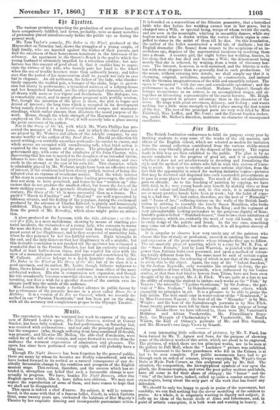tyr lyrstrrs.
The various promises respecting the production of new pieces have all been scrupulously fulfilled, and never, probably, were so ninny novelties of pretension placed simultaneously before the public eye as during the present week.
Mr. Tom Taylor's comedy, The Babes in the Wood, produced at the Haymarket on Saturday last, shows the struggles of a young couple, of high family, who are married against the wishes of their parents, and find the sweetness of their honeymoon terminate in the bitterness of in- solvency. An apartment in the Queen's Bench is the goal to which the young husband is ultimately impelled by a relentless creditor; but mis- fortune has this amount of good about it, that it enables him to appre- ciate the virtues of his wife, who bravely puts her hand to the wheel when the sea of tiouble becomes more than ordinarily heavy, and takes care that the period of his incarceration shall be passed not only in ease but in elegance. An old nobleman, the father of the lady, who clandes- finely supports the wedded pair, a lounger of the clubs, large in preten- sion but scanty in performance, a tyrannical mistress of a lodging-house and her henpecked husband, are the other principal characters, and are all drawn with more or less vigour and distinctness. The dialogue, too, is remarkably smart, and in many places pregnant with worldly wisdom. But, though the intention of the piece is clear, the plot is vague and devoid of interest ; the long time which is occupied in its development being mainly devoted to a series of complicated scrapes and misunder- standings, which rather obscure than illustrate the moral purpose of the work. Hence, though the whole strength of the Haymarket company is employed on The Babes in the Wood, it will scarcely take a place among the great successes of its author.
Nor is the Story of the '45, with which Mr. Watts Phillips has pre- sented the manager of Drury Lane, and in which the chief characters arc played by Mr. Webster and others of the Adelphi company, by any means worthy of the author of the Dead Heart. His old predilection for novel-writing,—a veritable cacoethes scribendi—he carries to excess, and whole scenes are occupied with unenlivening talk, when brisk action is required by the very nature of the piece. The principal character is a government spy, with some of the attributes of Sir John Chester, who, discovering that his son is married to the daughter of an intended victim, labours to save the man he had previously sought to destroy, and suc- ceeds in the attempt at the cost of his own life. This character, which is admirably played by Mr. Webster, might have been an effective centre of interest, if the situations had been closely packed, instead of being dis- tributed over an expanse of wearisome matter. That the whole interest of his story is concentrated in two or three leading personages, the author does not seem to have perceived, and hence he has "written up" cha- racters that do not produce the smallest effect, but lessen the for.c of the more striking scenes. As a spectacle illustrating the middle of the last century, The Story of the '45 is more successful than as a drama. Ho- garth's "March to Finchley" and "England" are well represented by tableaux vivants, and the feeling of the populace, during the excitement produced by the advance of Charles Edward, is plainly and humorously exhibited. Then, there is a lovely view of the Thames by moonlight, from the pencil of Mr. Beverley, which alone might prove an attrac- tion.
A piece produced at the Lyceum, with the title Adrienne ; or the Se- cret of a Life, is a mere melodrama, showing by means of startling pic- torial incidents, the vicissitudes of a young lady, who consents to marry the man she hates, that she may prevent him from revealing the sup- posed secret of her illegitimacy, and is then suspected of murdering him, when he dies poisoned by her too faithful servant. Right triumphs in the end, and the lady discovers that her illegitimacy is all a mistake, but this desirable conclusion is not reached till the spectator has witnessed a wonderful duel in the Pontine Marshes, has had his curiosity raised and baffled at least half-a-dozen times, and has regaled his eyes with the view of a mountain-pass most admirably painted and constructed by Mr. W. Callcott. Adrienne belongs to a much humbler class than either The Babes in the Wood or The Story of the '45; but of its class it is a good specimen, and its author, Mr. Leslie, though hitherto unknown to fame, shows himself a more practical craftsman than either of the more celebrated writers. His aim is compression not expansion, and though his tale occasionally becomes somewhat obscure, it never ceases to be in- teresting, nor does a wish for a speedier descent of the curtain ever in- sinuate itself into the minds of the audience.
Miss Louisa Keeley has made a further advance in public favour by her performance of the juvenile heroine in a piece called Home for a Holiday. It is a version of Le Fen an Convent, which we recently de- scribed in our "Parisian Theatricals," and has been put on the stage, with all the accuracy and completeness proper to the Olympic Theatre.


























 Previous page
Previous page